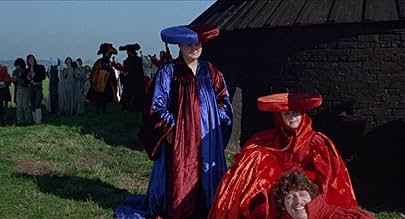IMDb RATING
6.3/10
8.4K
YOUR RATING
Pasolini's artistic, sometimes violent, always vividly cinematic retelling of some of Chaucer's most erotic tales.Pasolini's artistic, sometimes violent, always vividly cinematic retelling of some of Chaucer's most erotic tales.Pasolini's artistic, sometimes violent, always vividly cinematic retelling of some of Chaucer's most erotic tales.
- Awards
- 1 win
Orla Pederson
- Pilgrim
- (as OT)
Derek Deadman
- The Pardoner
- (as Derek Deadmin)
George Bethell Datch
- Host of the Tabard
- (as George B. Datch)
- Director
- Writers
- All cast & crew
- Production, box office & more at IMDbPro
Storyline
Did you know
- TriviaRemarkably, this is the only major cinematic take on Geoffrey Chaucer's classic tales.
- GoofsSome of the women have tan-lines from bikinis.
- Quotes
The Wife from Bath: There's nowhere in the Gospels that says we ought to stay virgins. Anyway, tell me, what were the genital organs made for at the creation? Not to lie dormant I suppose. And nobody's going to tell me they were just put there to piss through. Mark you, I use it for that as well. And every man must serve his wife in wedlock...
- Alternate versionsThe original UK cinema version was cut by the BBFC with edits to anal sex shots, a man being whipped, and Rufus urinating on the crowd during the 'Pardoner's Tale' segment for an 'X' certificate. The cuts were fully restored in 2001 and the certificate downgraded to a '15'.
- ConnectionsFeatured in Playboy: The Story of X (1998)
- SoundtracksThe Old Piper
written by Carl Hardebeck in 1912
performed by Frank McPeake
Played over the opening credits and sung frequently by Perkin the Reveler in the Cook's Tale
Featured review
As far as where this one sits on the film map, it's somewhere between Belle de Jour and Tinto Brass's Caligula.
The most important credit Pasolini's setting of the Canterbury Tales deserves is for its dismissal of the usual on-screen morality. Such candor seems essential to the nature of such a narrative (being much more appreciated than the stifled decadence of Keir Dullea's Marquis de Sade or the early Warhol/Morrissey efforts). This is most effective because the film also depicts the baseness and depravity of the late Middle Ages. Everyone's fornicating or trying to fornicate everyone else, with lots of potty humor thrown in just to make sure that it wouldn't be taken too seriously as a foray into art-house pretensions.
On all other counts, it's overblown and a bit sluggish, with an especially disappointing outcome au montage son. And non-professional actors are much less effective in adding a dimension of realism than they are in inducing a sense of self-mockery. The imagery is shamelessly ribald although not extreme, and the storyline is far from seamless. Far from Pasolini's best, although perhaps a good preparation for the far more intense Salo.
The most important credit Pasolini's setting of the Canterbury Tales deserves is for its dismissal of the usual on-screen morality. Such candor seems essential to the nature of such a narrative (being much more appreciated than the stifled decadence of Keir Dullea's Marquis de Sade or the early Warhol/Morrissey efforts). This is most effective because the film also depicts the baseness and depravity of the late Middle Ages. Everyone's fornicating or trying to fornicate everyone else, with lots of potty humor thrown in just to make sure that it wouldn't be taken too seriously as a foray into art-house pretensions.
On all other counts, it's overblown and a bit sluggish, with an especially disappointing outcome au montage son. And non-professional actors are much less effective in adding a dimension of realism than they are in inducing a sense of self-mockery. The imagery is shamelessly ribald although not extreme, and the storyline is far from seamless. Far from Pasolini's best, although perhaps a good preparation for the far more intense Salo.
- How long is The Canterbury Tales?Powered by Alexa
Details
- Release date
- Countries of origin
- Official site
- Languages
- Also known as
- Pasolinis tolldreiste Geschichten
- Filming locations
- Battle Abbey, East Sussex, England, UK(merchant's tale: hall interior)
- Production companies
- See more company credits at IMDbPro
Box office
- Gross worldwide
- $9,028
- Runtime1 hour 51 minutes
- Sound mix
- Aspect ratio
- 1.85 : 1
Contribute to this page
Suggest an edit or add missing content





















